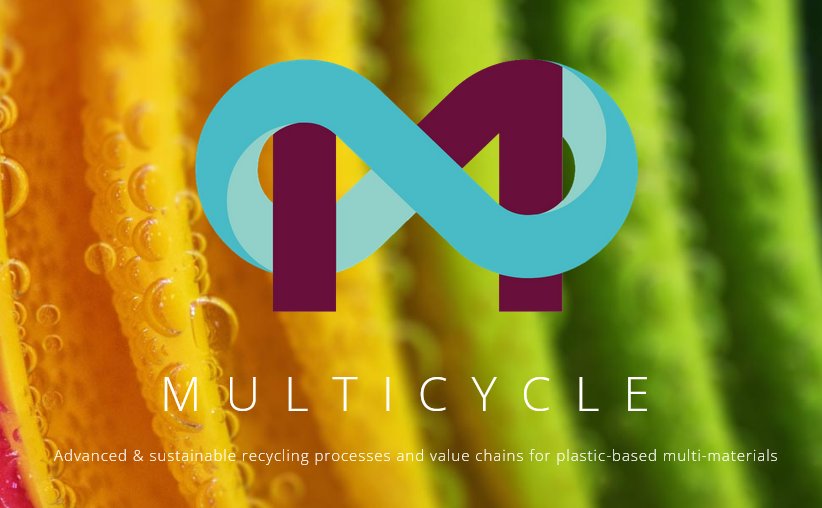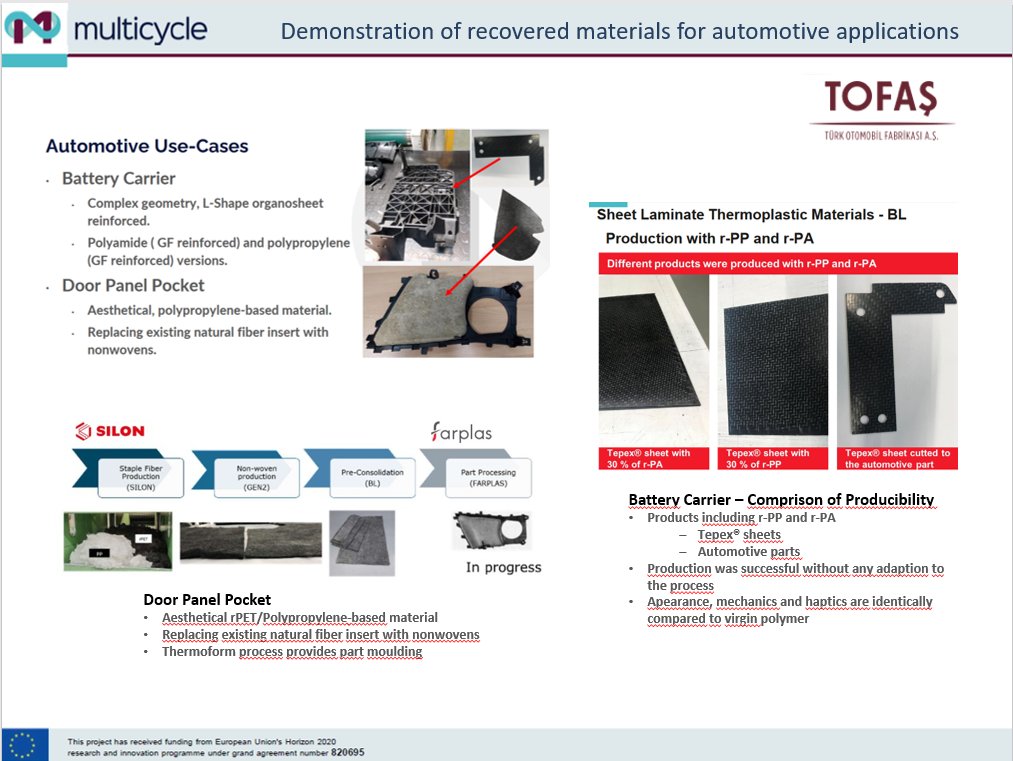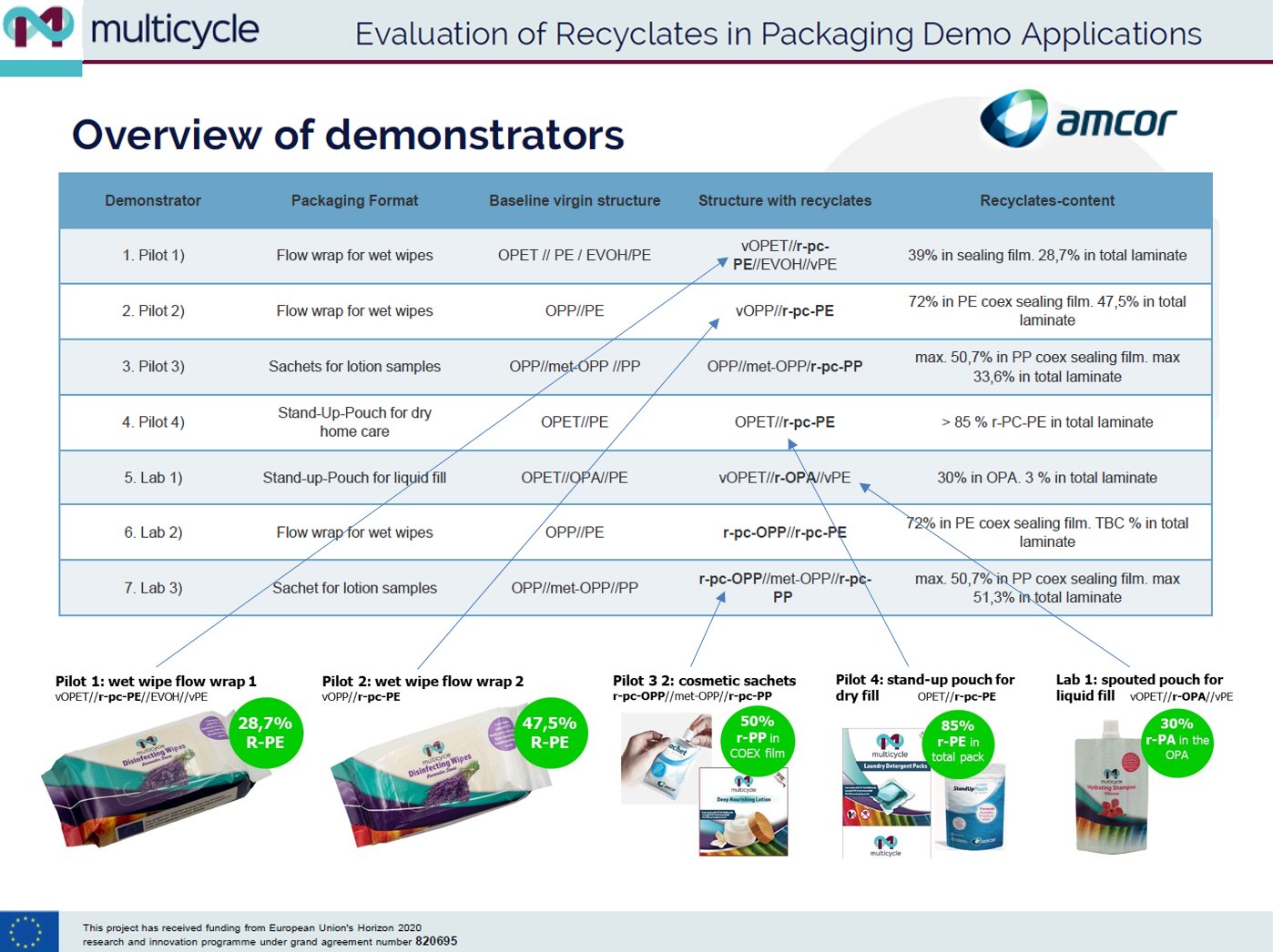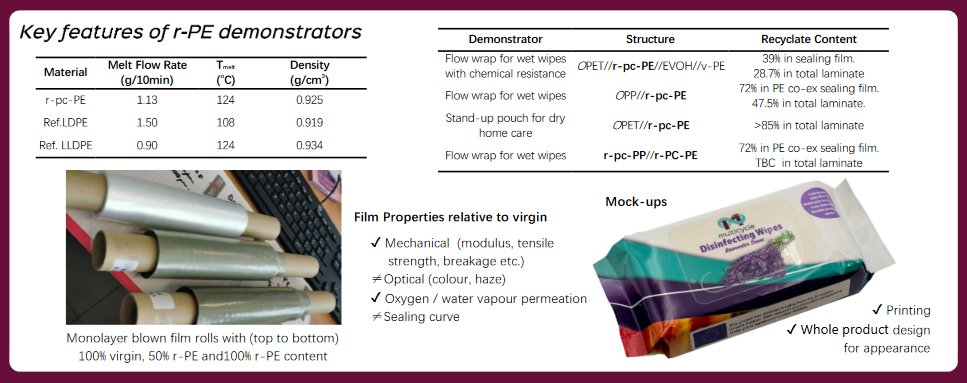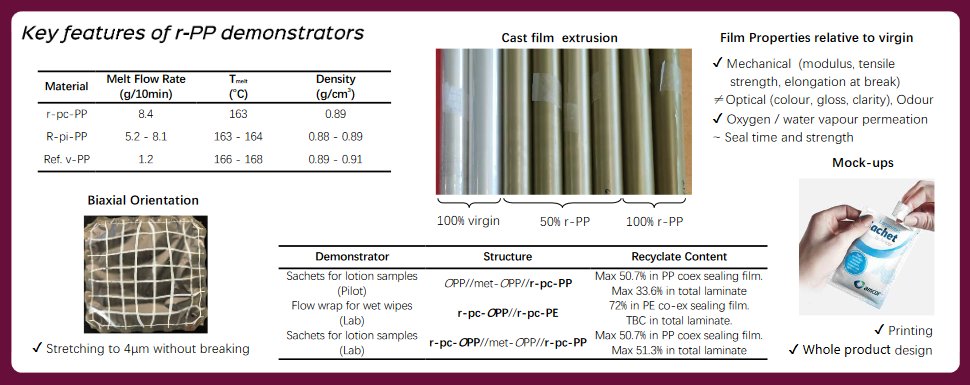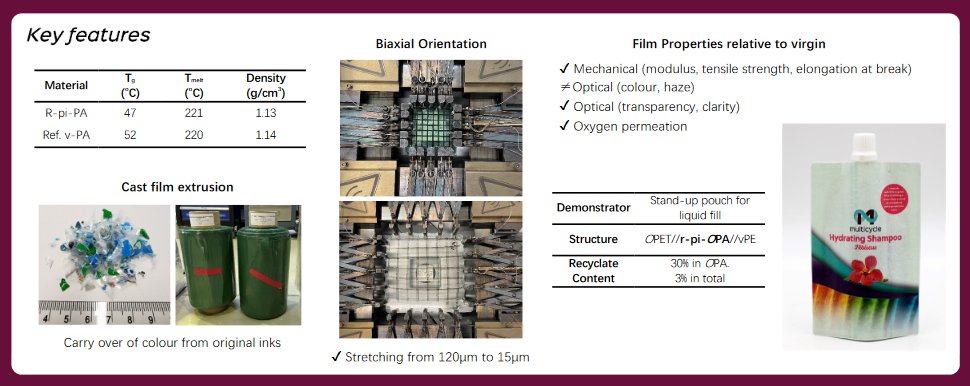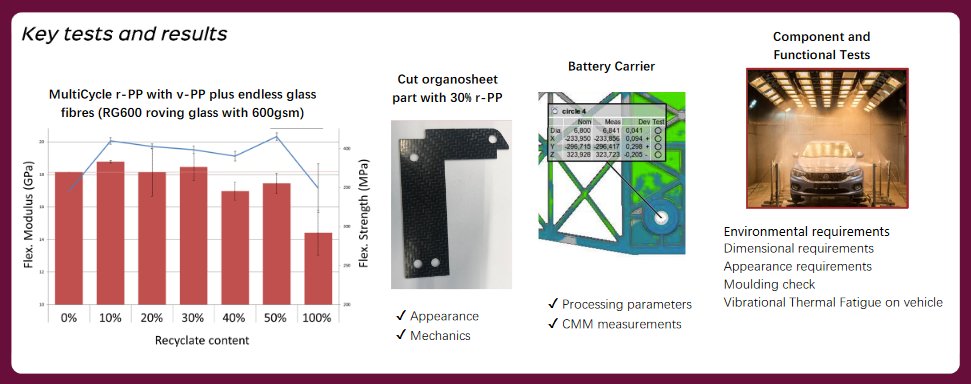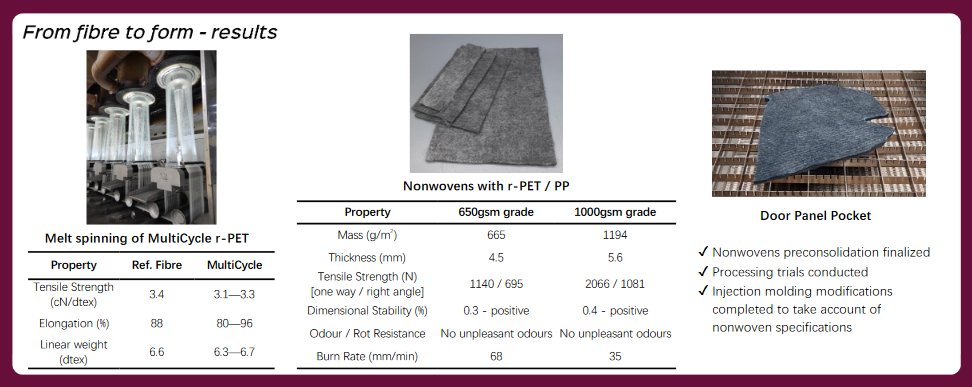CreaSolv® Pilot plant for Packaging & Automotive Compounds – MultiCycle Project
Less than 1/3 of plastic packaging waste is currently recycled due to technological and economic limitations, thus considering plastic as a single use commodity and the waste as a (financial) burden instead of a “resource”. In its new “Plastic Strategy1)” the European Commission set out a vision that includes cost-effective recycling, larger recycling capacities and a more integrated plastic value chain. The MultiCycle2) project is aimed at stopping resource depletion, land-filling and incineration in regards to plastic waste streams of the packaging and automotive sector.
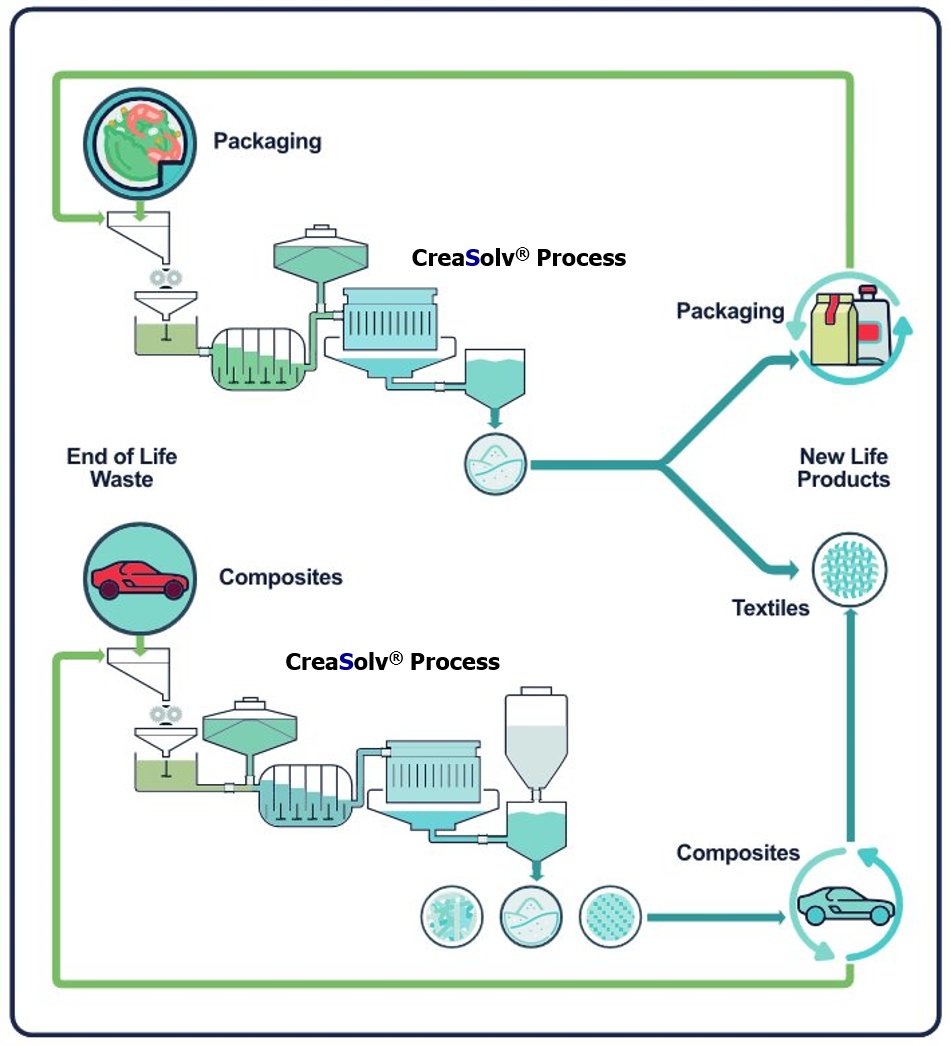 MultiCycleIt started on 1 November 2018 and lasted until 30 April 2022. It is based on the CreaSolv® Process, which will be taken to pilot scale and digitized for industrial readiness. Pure plastics and fibers from mixed waste streams will be recovered without downgrading and the subsequent processing and formulation of the recycled materials into valuable products will be optimized. MultiCycle will also produce policy recommendations promoting waste management and resource efficiency improvements for the target packaging and automotive applications:
MultiCycleIt started on 1 November 2018 and lasted until 30 April 2022. It is based on the CreaSolv® Process, which will be taken to pilot scale and digitized for industrial readiness. Pure plastics and fibers from mixed waste streams will be recovered without downgrading and the subsequent processing and formulation of the recycled materials into valuable products will be optimized. MultiCycle will also produce policy recommendations promoting waste management and resource efficiency improvements for the target packaging and automotive applications:
- Multilayer Packaging, including films that cannot be recycled cost-effectively to date and altogether account for approximately 50% of plastic packaging (~10 million tons per annum in the EU).
- Fiber reinforced thermoplastic automotive composites with plastics representing approximately 16% of ELV (End of Life Vehicle) weight (~1 million tons per annum in the EU).
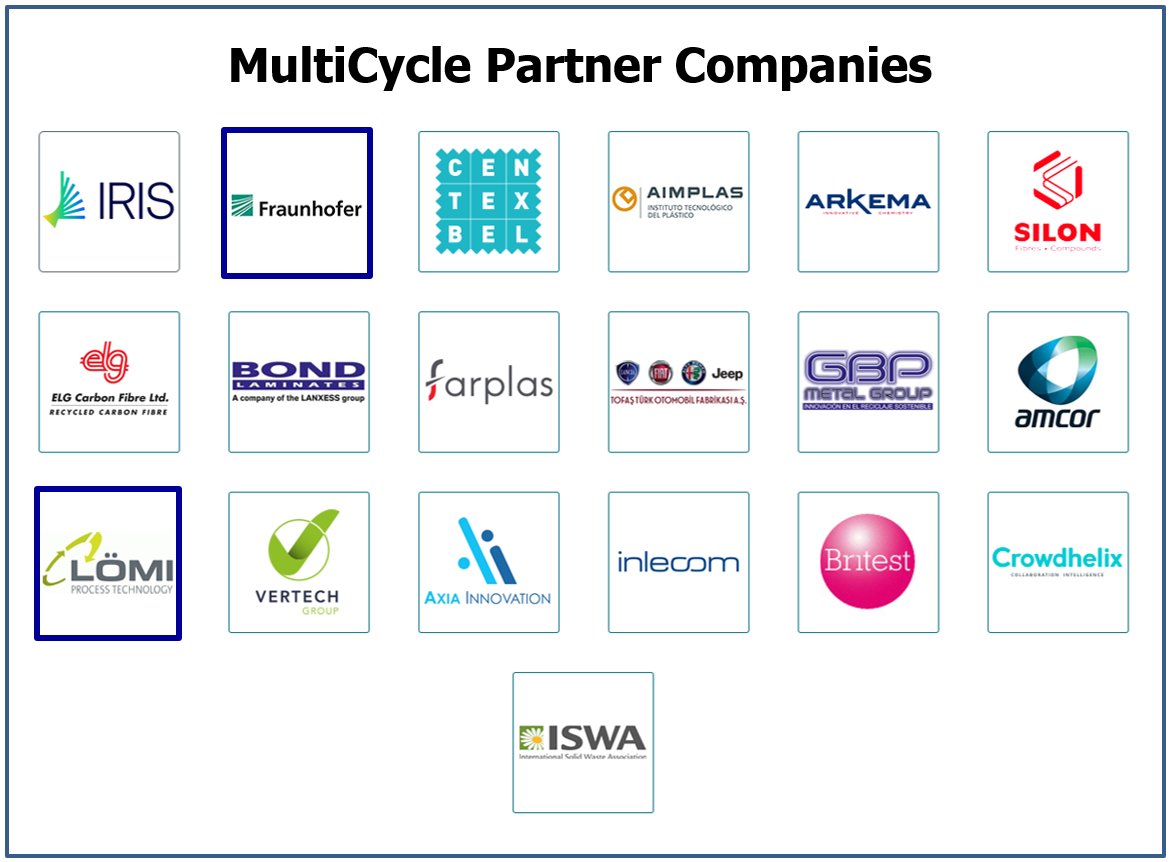 The € 9.7 Million MultiCycle project is supported by € 7.7 Million of EU funding awarded under the “CE-SPIRE 10-2018 Efficient recycling processes for plastic containing materials (IA)” call. The project consortium involves 19 partners from 10 countries across Europe including Fraunhofer IVV and LÖMI3).
The € 9.7 Million MultiCycle project is supported by € 7.7 Million of EU funding awarded under the “CE-SPIRE 10-2018 Efficient recycling processes for plastic containing materials (IA)” call. The project consortium involves 19 partners from 10 countries across Europe including Fraunhofer IVV and LÖMI3).
September 2020 – Representative industrial scrap and post-consumer waste samples were collected. Critical process parameters for a stable plant operation have been identified on lab scale and small batch pilot experiments. Plastics and composites were recovered from waste and characterized and reprocessed.
October 2020 - The versatile MultiCycle CreaSolv® Pilot plant for automotive and packaging waste (that is not suitable for mechanical recycling) enters its operational phase for the recovery of high-quality recycled polymers and polymer-free fibers for RE-USE in high end applications. It has a capacity of 25 kg/hour, a Technical Readiness Level TRL7 and fulfills the ATEX Directive 2014/34/EU.
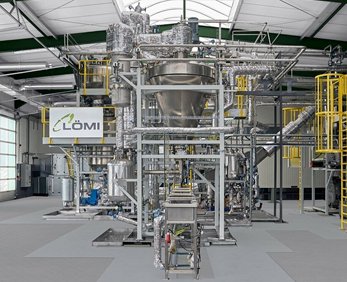
Recycled PP, PE or BioPE, PA6 and PET or BioPET from post-industrial and post-consumer flexible packaging waste were reused for new mono and multilayer packaging films for bags, pouches and sachets. PET was also spun to textile fibers.
Recycled PP, PA6.6, PA12 and BioPA from post-industrial automotive scrap or ELV parts were reused for new compounds, textile fibers and composite materials. Recycled short and long glass and carbon fibers were reused for new thermoplastic fiber reinforced composite materials.
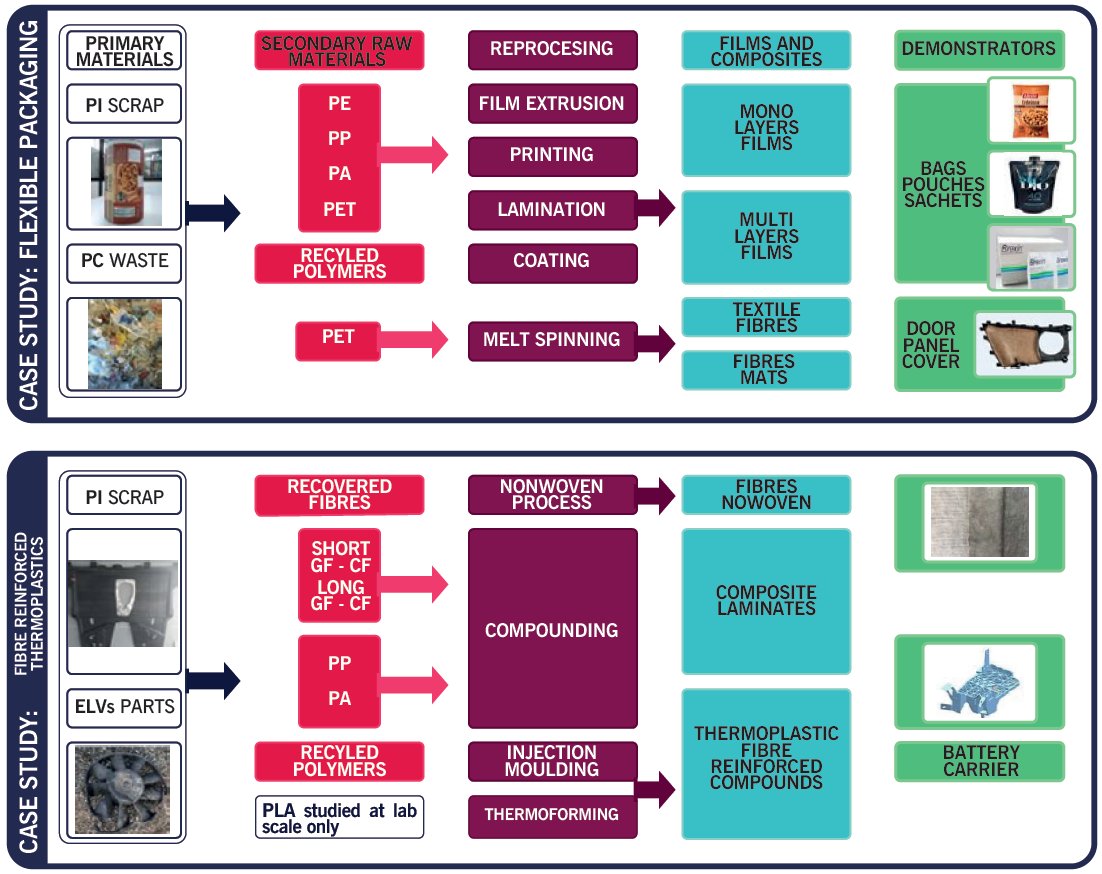 In order to evaluate the processability of recycled polyamide-6 (PA6) from multilayer films, a 30/70 rPA6/virgin PA6 (melt spinning grade) blend was processed on a lab-scale extrusion line equipped with a multifilament die. Homogeneous flow was observed with no melt fracture or filament fusion evident, and the multi-filaments could easily be placed onto the take-up and drawing godets downstream in the process.
In order to evaluate the processability of recycled polyamide-6 (PA6) from multilayer films, a 30/70 rPA6/virgin PA6 (melt spinning grade) blend was processed on a lab-scale extrusion line equipped with a multifilament die. Homogeneous flow was observed with no melt fracture or filament fusion evident, and the multi-filaments could easily be placed onto the take-up and drawing godets downstream in the process.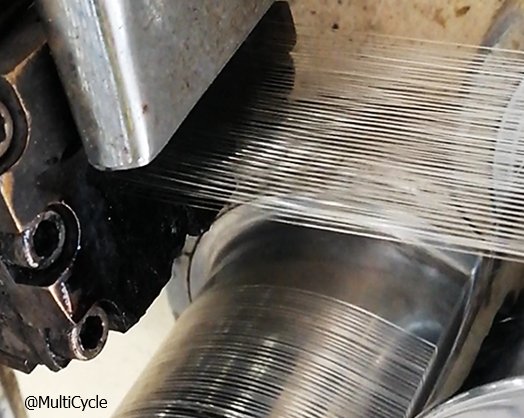 The 30/70 rPA6/virgin PA6 blend was subsequently processed on a Spinmaster pilot multifilament extrusion line. The results of tensile tests indicate that more brittle filaments were obtained compared to vPA6 filaments, but tenacity was similar to virgin filaments. Further optimization of the extrusion parameters is currently ongoing.4)
The 30/70 rPA6/virgin PA6 blend was subsequently processed on a Spinmaster pilot multifilament extrusion line. The results of tensile tests indicate that more brittle filaments were obtained compared to vPA6 filaments, but tenacity was similar to virgin filaments. Further optimization of the extrusion parameters is currently ongoing.4)
Several blends of thermoplastic compounds incorporating different percentages of recycled polyethylene (rPE) have been processed on a pilot blown film extrusion line. Extrusion of compounds incorporating rPE at 40% to 100% content has proven feasible, with a smooth process attained using similar operating parameters to those for virgin raw material.
Films incorporating rPE show mechanical performance in the same range as virgin PE grade film. These promising results obtained at pilot plant level will lead to further optimization and scale-up in the production of rPE films to be used in packaging applications.4)
MultiCycle - Achievements
March 2022 – At the MultiCycle Automotive Dissemination Event TOFAS (car manufacturer – Turkey) outlined the key research and technology developments enabling recovery of high quality PP, PA6 and PA6.6, and PET recyclates from challenging post-industrial and post-consumer composite wastes streams (e.g. glass fibre reinforced composites) and the emerging results of how recyclates of the CreaSolv® Process performed when being substituted for virgin materials in the manufacture of both functional and aesthetic car parts. View the complete presentation -> YouTube Videoplaylist.
April 2022 – At the MultiCycle Flexible Packaging Dissemination Event Amcor (leading global packaging company) demonstrated the capabilities of the CreaSolv® Process for post-industrial (pi) and post-consumer (pc) flexible packaging waste. Properties and processability of recovered materials were characterized and compared to virgin flexible packaging for specified home personal care market. Additionally, small series of prototype flexible packaging formats have been produced containing a significant % of pi/pc recycled materials, which would meet industrial requirements. View the complete presentation -> YouTube Videoplaylist.
Case Studies
- PE - Maximize the Use of r-PE in Flexible Packaging - Evaluation of post-consumer waste derived polyethylene recyclates (r-pc-PE) in commonly encountered packaging formats for home and personal care applications, specifically flow wraps for wet wipes. It features a first time demonstrated use of recyclates sourced from co-mingled, printed flexibles from household municipal waste without special pre-sorting. Please click on the image to open the case study.
2. PP - Circular Plastics in Personal Care Applications - Evaluation of post-consumer waste derived polypropylene recyclates (r-pc-PP) in lotion sachets and stand-up pouches, both commercially relevant packaging formats for home and personal care applications. r-PP has been used at high concentrations to produce cast and biaxially oriented films, a notable first-time demonstration. Please click on the image to open the case study.
3. PA – Polyamide recycled from post-industrial scrap in Flexible Packaging - Polyamide recovered from mixed post-industrially sourced scrap packaging film, r-pi-PA, has been evaluated as part of a demonstration design for a liquid fill stand-up pouch typically used in home and personal care applications. r-PA has for the first time been successfully extruded into cast film and biaxially oriented at 30% inclusion rate. Please click on the image to open the case study.
4. PP & PA – Retaining the Value of Polymers in Automotive Scrap - Use of circular plastics in the production of a car battery carrier (tray) for internal combustion engine driven vehicles, a functional part housed within the confines of the vehicle engine compartment, where adherence to dimensional tolerances and stability are of prime importance. The study featured straightforward substitution of recyclate based formulations into sheet laminate and hybrid composite injection molding processes without sacrificing processability or properties. Please click on the image to open the case study.
5. PET – Recyclate-based Staple Fibers in an aesthetic nonwoven Form - A door panel pocket is an example of an aesthetically important vehicle interior part where thermoplastic-based nonwovens provide an alternative to natural fiber inserts. In this case study r-PET staple fibers were introduced into near-normal processes for the manufacture of pre-consolidated composite nonwoven sheet and forming. Please click on the image to open the case study
Life Cycle Assessments
April 2022 – For the preparation of the life cycle assessments, Fraunhofer UMSICHT examined 5 waste fractions:
- medium PE (60 wt.%) from flexible packaging waste incl. multilayer
- high PE (75 wt.%) from flexible packaging waste incl. multilayer
- PET adhesive (95 wt.%) from PE extraction remains from PE/PET multilayer packaging waste
- PP from glass fiber reinforced PP waste (55 wt.% PP) from ELV
- PA from glass fiber reinforced PA waste (50 wt.% PA) from ELV
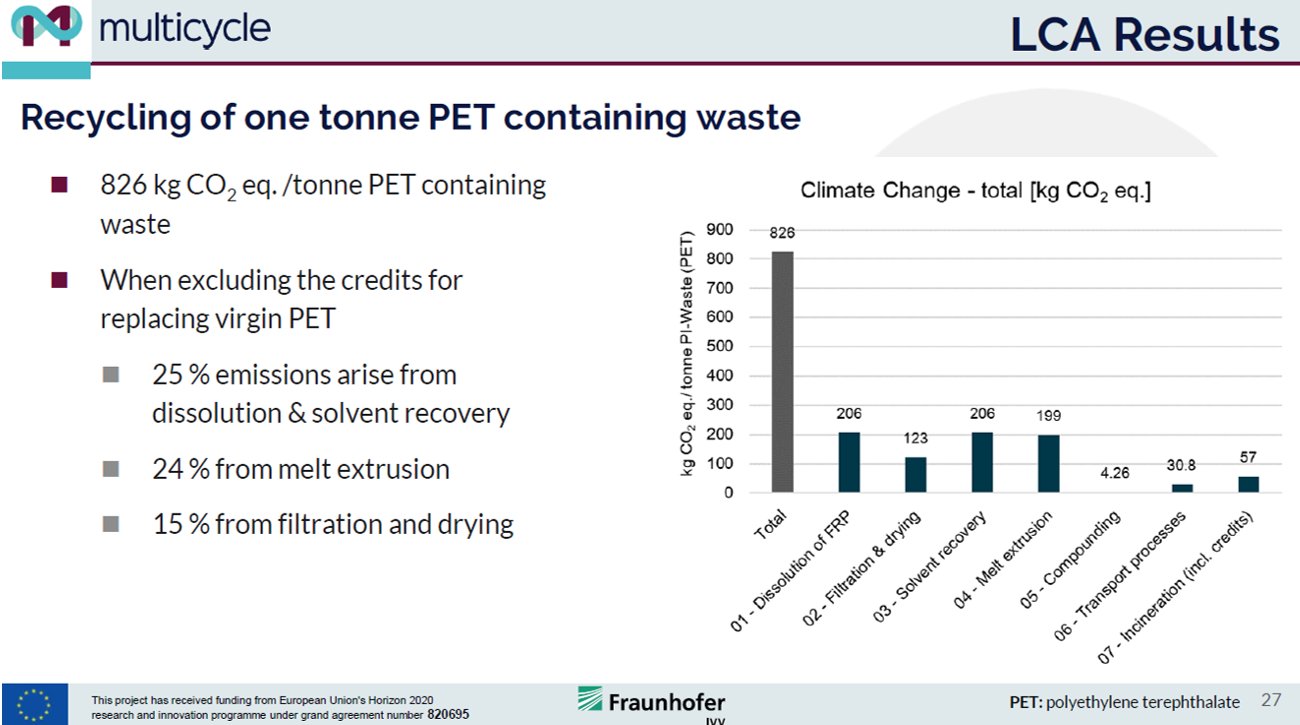 Waste collection and sorting (based on MEILO Sorting plant data) and recycling by "selective dissolution" (based on CreaSolv® Plant data) were considered.
Waste collection and sorting (based on MEILO Sorting plant data) and recycling by "selective dissolution" (based on CreaSolv® Plant data) were considered.
The recycled polymers and fibers were assessed in the production of
- Flow wraps based on data from AMCOR
- Car door pocket panels based on data from SILON, Gen2Carbon, Bond Laminates (LANXESS Group) and Farplas
- PP and PA based battery carrier (in car) based on data from SILON, Bond Laminates (LANXESS Group) and Farplas.
The results for all 5 LCAs have not yet been published by Fraunhofer UMSICHT. The LCA charts for PE(75%) and PET were presented by Fraunhofer IVV at the MultiCycle Flexible Packaging Dissemination Event.
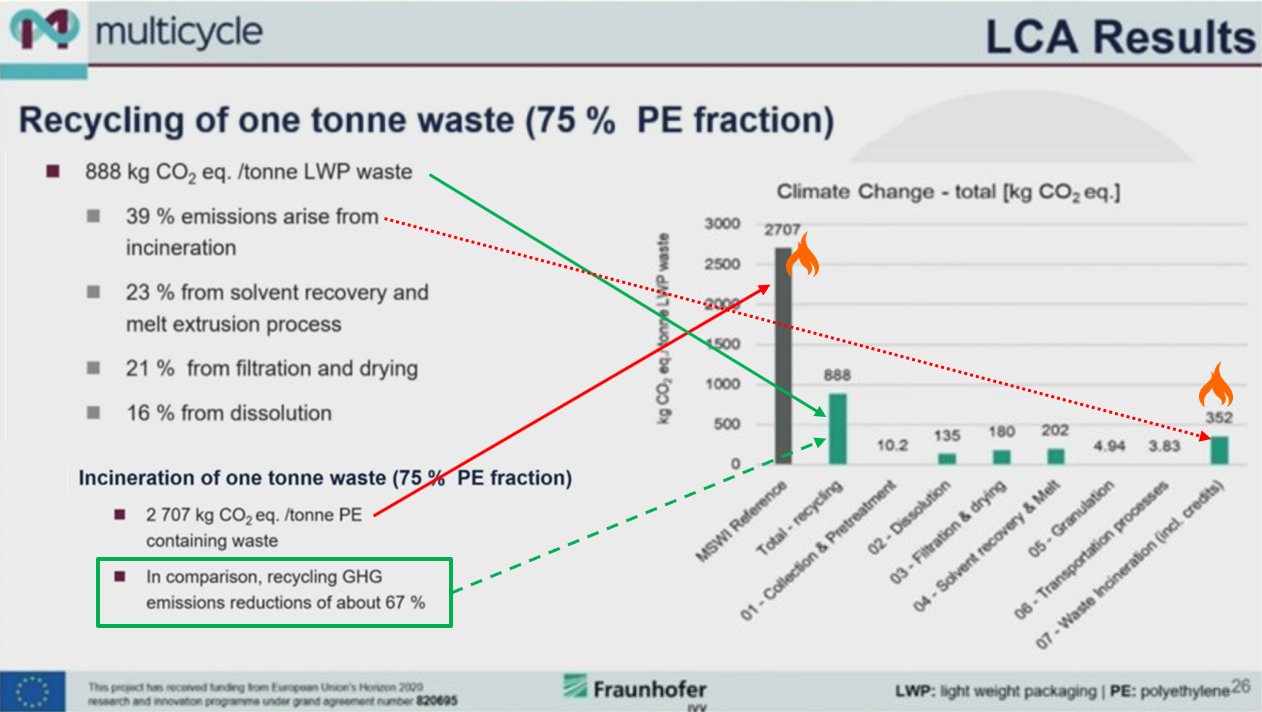 A Solvent-based Purification of 1 tonne plastic waste with the CreaSolv® Process (see example of the 75 wt.% PE fraction) releases only 1/3 of the CO2 emissions compared to its incineration. The incineration of the non-PE part releases much more CO2 than any other individual recovery process step!
A Solvent-based Purification of 1 tonne plastic waste with the CreaSolv® Process (see example of the 75 wt.% PE fraction) releases only 1/3 of the CO2 emissions compared to its incineration. The incineration of the non-PE part releases much more CO2 than any other individual recovery process step!
MultiCycle Video
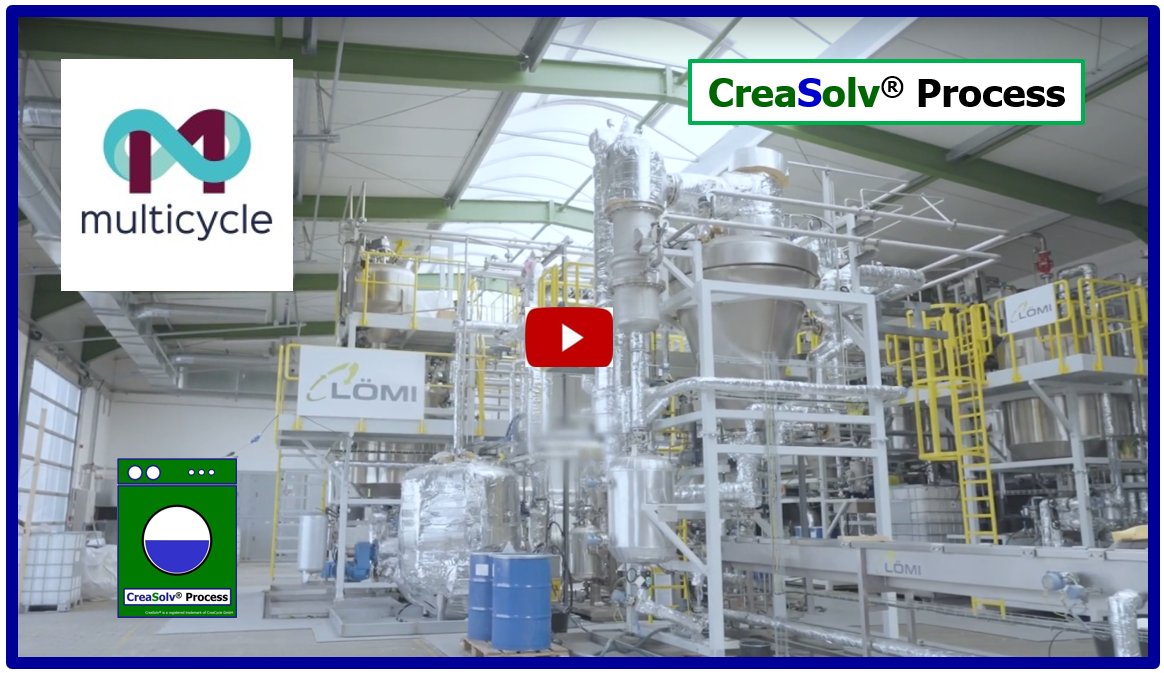 MultiCycle "Process Description" Video - 8 April 2022 - Link
MultiCycle "Process Description" Video - 8 April 2022 - Link
Multi-Purpose CreaSolv® Pilot Plant
 Effective May 2022 - after completion of the Multicycle Project, this multi-purpose CreaSolv® Pilot Plant will be available for sampling trials with research and industry partners to prepare commercial plants and operations.
Effective May 2022 - after completion of the Multicycle Project, this multi-purpose CreaSolv® Pilot Plant will be available for sampling trials with research and industry partners to prepare commercial plants and operations.
If interested, please follow this Link.
MultyCycle Homepage - terminated in 2023
- MultiCycle "Flyer" - May 2019 - Link
- MultiCycle "Progress Update" Poster 1 - January 2020 - Link
- MultiCycle "Progress Update" Poster 2 - September 2020 - Link
- MultiCycle "Midterm Activities Update" Brochure - September 2020 - Link
- MultiCycle Video - 4 December 2020 - Link
- MultiCycle "Automotive Dissemination Event Highlights" (6 presentations) - 28 March 2022 - YouTube Videoplaylist
- MultiCycle "Flexible Packaging Dissemination Event Highlights" (9 presentations) – Thursday 7 April 2022 – YouTube Videoplaylist
- MultiCycle "Case Studies" - 27 April 2022 - Link
Literature
- European Strategy for Plastics – Link
- MultiCycle project ID 820695 - Horizon 2020 “Advanced and sustainable recycling processes and value chains for plastic-based multi-materials” - Link
- MultiCycle project - New project to pilot selective recovery of pure plastics from multi-materials waste. Kick-off Meeting on 28 November 2018 – Link
- MultiCycle Homepage "Downstream Processing, Characterization and Evaluation of Recyclates" published 7 October 2021 - no longer available
